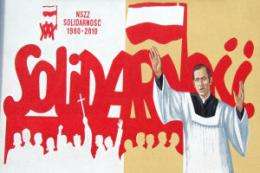Historian says media was wrong to condemn unions over Solidarnosc

The press - and 1980 Thatcher Government - unfairly criticised the trade union movement over its support for the newly formed Polish Solidarity Trade Union, according to the most detailed analysis of the period ever carried out.
Professor Stefan Berger, from The University of Manchester, says an initial slowness to react gave way to strong political and practical support - often behind the scenes- for Lech Walesa’s fledgling union by his UK counterparts.
The findings, a chapter in a new book published this month, emerge on the thirtieth anniversary of the tumultuous events which captivated the world in 1980.
“This research will force many historians and commentators- myself included - to revise their opinions of the part the unions played in supporting Solidarnosc during the 1980s,” said Professor Berger.
“Though the picture is complicated, we should applaud the enormous efforts of the majority of British Trade Unionists.
“It’s fair to say the almost unanimous hostility to the unions by the press and politicians at that time was misplaced and did not reveal the true picture.
“The TUC even held talks with the Thatcher government over how best to co-ordinate reactions to the imposition of martial law in Poland in 1980.
“The Foreign Secretary, Lord Carrington, actually counselled caution stressing how unstable the situation in Poland was.”
However, not all unionists were supportive: prominent individuals and their unions -such as Arthur Scargill and Bob Crow - were critical of Solidarnosc.
Another prominent doubter, says Professor Berger, was Tony Benn, who noted in his diary that Labour and the TUC in supporting Solidarity were ‘supporting Polish Thatcherism’.
The TUC also had the tricky task of distancing itself from Margaret Thatcher and Ronald Reagan- their ideological enemies - who were vocal supporters of the Polish Union.
Prof Berger said: “At times, the TUC were cautious, but that was down to a desire to avoid a second Cold War and avoid intra-union tensions.
“But this should not deflect attention away from the basic fact that it remained, from beginning to end, committed to the values of free trade unionism.
“Solidarnosc’s Catholicism and nationalism also came in for a lot of criticism though from the same British left wingers who supported the cause of Catholic nationalism in Northern Ireland.
“When Walesa visited the TUC in December 1989, he singled out the unlikely combination of the government of Margaret Thatcher and the TUC as vital allies – and this should not be forgotten.”
Measures taken by the Unions to help the Poles included:
• Behind the scenes, the TUC tried to use its contacts with official East European trade unions as a bargaining chip to support Solidarnosc. It also continually lobbied the Polish ambassador in London.
• A TUC support fund, raising tens of thousands of pounds for the Poles.
• Between 1981 and 1983, the TUC sent thirteen lorries of food, about 200 tons, which was distributed by the Polish Church Charity Commission.
• Sending office equipment, printing and duplicating machinery and paper.
• Training Solidarnosc officials.
• Making numerous declarations condemning the imposition of martial law and offering support for the Poles.
• The TUC broke off relations with the some Communist Trade Unions in Eastern Europe, in protest of their support for the imposition of martial law in Poland.
• Organising public demonstrations.
• Twinning arrangements between British unions and Solidarnosc regions.
More information: Solidarity with Solidarity: Western European Trade Unions and the Polish Crisis, 1980-1982 is published by Lexington Books.
Provided by University of Manchester














